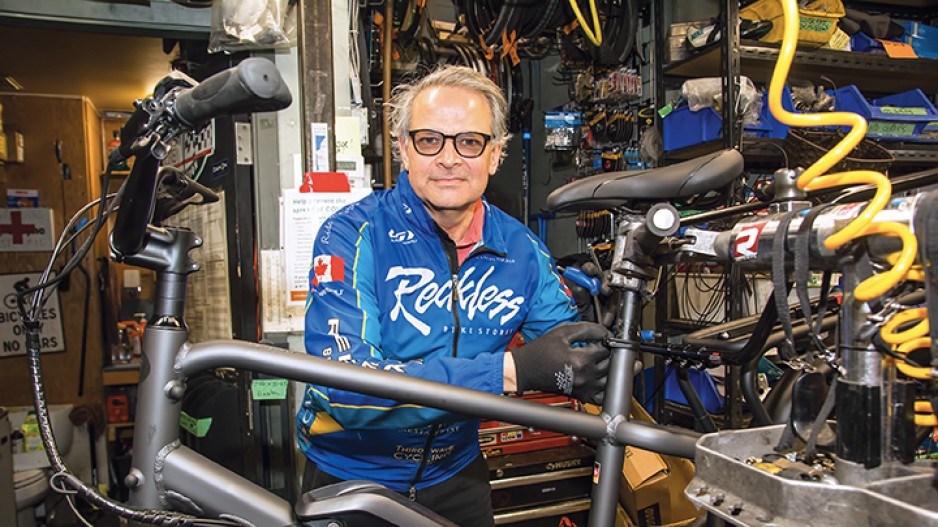How well cycling-sector entrepreneurs are doing during the COVID-19 pandemic depends on their niche.
Bicycle-rental businesses were closed for much of the last few months and have struggled since reopening. The Vancouver Bike Share Inc.’s Mobi shared-cycling service has also seen ridership tank.
Vancouver retailers say new and used bicycle sales, in contrast, have surged, an increase reflected in the latest earnings report from Montreal-based multinational bicycle manufacturer Dorel Industries Inc. (TSX:DII-B).
Sales for accessories, such as stationary trainers, which convert a regular bike into a motionless one, and bicycle pumps have also risen sharply, Reckless Bike Stores owner Paul Dragan told Business in Vancouver.
His bicycle repair business has remained busy.
“We felt that our bike store ticked three boxes that we thought were notable,” Dragan said. “People want to get some fresh air and exercise. They want a mental break from whatever, and many people do not want to get on public transit.”
A fourth reason many people have been buying bikes, he said, is that the meal-delivery sector grew significantly when restaurant dining rooms were forced to close, and many of those drivers use bicycles.
Dragan’s repair business has boomed alongside his retail sales – much like they did during transit strikes last year, he said. People are bringing in bikes that appear to have been gathering dust for years, he said.
Bike sales normally account for 50% of his business, while repairs are about 35% and rentals are 15%.
He estimated that rental revenue is down about 90% from what he would have otherwise expected starting in March. Overall, however, Dragan said revenue is up about 40% from what he would have expected.
Sales were so good that he ran out of some stock. Dragan’s solution was to dig into his rental operation’s inventory, which included about 150 bikes.
A lot of the bikes that had been bought for rental “were new and had never been used as rentals,” he said. “So we could say to somebody looking in the $400 to $600 range, ‘For $400, I’ve got a used rental, and for $600, I’ve got a new rental.’”
Financial statements from Dorel Industries, which operates in 25 countries, backs up Dragan’s assessment that bike sales are booming. The company said sales in its first quarter, ended March 31, showed sales “growth [was] accelerating particularly in the last two weeks of March, as consumer demand for bikes spiked amid the pandemic lockdowns.”
In May, the company said it had seen “April bicycle sales surge as families seek exercise and alternatives to vacations.”
Vancouver’s Mobi bike-share program suffered as people bought bikes. Since mid-March, Mobi’s ridership has fallen 45%, Mobi general manager Mia Kohout told BIV.
“This decline has primarily been commuters who are staying at home to work, and the nonexistent tourist market,” she said.
Some users may not have wanted to use the same bikes as others because of a perceived potential risk of COVID-19 infection.
To keep its bikes in use, and as a community gesture, Kohout said Mobi has provided nearly 700 free 90-day passes to essential workers, such as those who work in health care.
Business owners who rely on renting bicycles for most of their revenue have been hard hit.
“The main part of our business is rentals, and we weren’t able to do that for more than two months,” English Bay Bike Rentals owner Joe Kainer told BIV.
“Even now that we’re starting to do it again, it’s a bit slow. We had amazing weather when we weren’t able to open. Then we’ve had crummy weather when we are open.”
Kainer said that he has not shifted to retail bike sales because his rental location and next-door repair shop’s combined 2,000 square feet of space is insufficient.
“It’s also a huge outlay of capital to buy enough bikes to do a full retail operation,” he said. •




